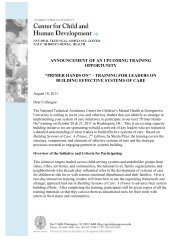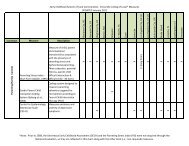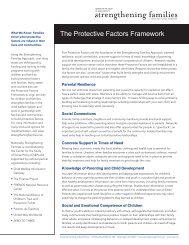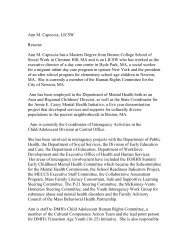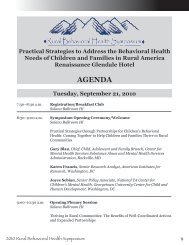Training Institutes 2012 - National Technical Assistance Center for ...
Training Institutes 2012 - National Technical Assistance Center for ...
Training Institutes 2012 - National Technical Assistance Center for ...
You also want an ePaper? Increase the reach of your titles
YUMPU automatically turns print PDFs into web optimized ePapers that Google loves.
WORKSHOP #23 10:30 AM FRIDAY • 1:30 PM SATURDAY • DESTIN 1-2<br />
Implementing, Sustaining, and Expanding the Wraparound Approach<br />
OBJECTIVES—Participants will learn:<br />
1. To describe the key components of implementing wraparound statewide including wraparound enrollment standards<br />
and procedures<br />
2. How to ensure wraparound model fidelity and positive outcomes of wraparound through evaluation<br />
3. How to sustain wraparound by using unique financing strategies across child-serving systems<br />
4. Strategies and methods to provide training, technical assistance, and coaching<br />
5. To identify the important partnerships among state and local communities, youth, and families to improve and<br />
sustain wraparound<br />
This Workshop will focus on how to implement and sustain the wraparound approach broadly throughout states. The<br />
strategies to be highlighted include financing strategies; interagency agreements, training and technical assistance,<br />
evaluation, and wraparound enrollment standards that ensure model fidelity.<br />
The strategies are based on experience in Michigan to implement, expand, and sustain wraparound statewide, including<br />
requirements <strong>for</strong> all wraparound providers to ensure consistency. These requirements identify wraparound enrollment<br />
standards, address caseload sizes, outline supervisory/coaching requirements, define the role of the community team,<br />
specify training expectations, and include evaluation/fidelity requirements. Michigan’s experience can assist other states<br />
and communities regarding challenges, barriers, and successes of implementing wraparound.<br />
The specific topics to be covered include:<br />
• The process <strong>for</strong> wide-scale implementation of wraparound<br />
• Lessons learned in implementing wraparound in Michigan to establish wraparound fidelity statewide across childserving<br />
systems<br />
• Wraparound enrollment requirements and procedures<br />
• A training model, requirements, and annual calendar<br />
• Financing structures and how to maximize funding through blended funding strategies<br />
• Strategies <strong>for</strong> evaluation and sharing wraparound data<br />
• The importance of and strategies <strong>for</strong> creating partnerships among states and communities, youth, and families<br />
Faculty will use video and demonstrations to illustrate the processes involved in wraparound implementation,<br />
particularly with respect to training. The faculty team will offer the perspective of a state mental health administrator,<br />
national wraparound trainer, and state wraparound training team, all of whom have facilitated wraparound.<br />
MODERATOR/PRESENTER: Constance Conklin, L.M.S.W., Director or Programs <strong>for</strong> Children with a Serious<br />
Emotional Disturbance, Mental Health Services to Children and Families, Michigan Department of Community Health,<br />
Lansing, MI<br />
Craig Delano, Wraparound Trainer, Michigan Wraparound, Hart, MI<br />
Millie Shepherd, Wraparound <strong>Training</strong> and <strong>Technical</strong> <strong>Assistance</strong> Coordinator, Mental Health Services to Children and<br />
Families, Michigan Department of Community Health, Lansing, MI<br />
<strong>Training</strong> <strong>Institutes</strong> <strong>2012</strong><br />
WORKSHOPS<br />
83



